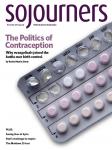EARLIER THIS YEAR Pope Francis titillated the world’s 1.2 billion Roman Catholics when he said we should not feel compelled to breed “like rabbits.” The Twitterverse resounded with commands to “hop to it.” The Italian press dubbed Francis’ speech the “Sermon of the Rabbit.”
In it, Pope Francis said, “Some think that—excuse the language—that in order to be good Catholics, we have to be like rabbits. No. Responsible parenthood.”
Was the pope changing Catholic teaching on birth control? On the contrary, Francis went on to underscore that “responsible parenthood” requires that couples regulate the births of their children, as Vatican teaching allows, using natural family planning methods.
What we think of as “the Catholic position” on contraception—“‘Every action which ... proposes to render procreation impossible’ is intrinsically evil”—was actually codified as official teaching in 1930 under Pope Pius XI and was part of a larger conversation in Christendom. At the 1930 Lambeth Conference, for example, the Anglican bishops approved a resolution stating: “In those cases where there is such a clearly felt moral obligation to limit or avoid parenthood, and where there is a morally sound reason for avoiding complete abstinence, other methods [of contraception] may be used, provided that this is done in the light of the same Christian principles.”
In 1951, Pope Pius XII overtly accepted natural family planning as a moral form of regulating births, in limited circumstances, within Christian marriage. He also emphasized the importance of a mature and informed conscience in moral reasoning. “It is correctly argued,” he wrote, “that the true meaning of adult independence is not to be led like a little child.”
As part of the process around the Second Vatican Council, Pope Paul VI oversaw a commission to examine the use of oral contraceptives in light of church teaching. The commission’s report—titled “Responsible Parenthood”—argued for the use of artificial contraception within Christian marriage. In the end, Pope Paul VI rejected the commission’s recommendation, and his 1968 encyclical Humanae Vitae reaffirmed the church’s teaching against artificial contraception.
According to a 2014 survey of Roman Catholics around the world, 78 percent support the use of artificial contraceptives. Why? Because contraceptives are an imperfect yet prudent aid for spouses who are responsibly planning a family, for slowing the spread of sexually transmitted diseases (in the case of male and female condoms), and for protecting sexually vulnerable women and girls.
The fact that most Catholics support the use of contraception shouldn’t necessarily be viewed as a lack of respect for Vatican teaching. It may mean that Catholic lay people have a different interpretation of the principles behind the instruction or are in a significantly different moral situation than those promulgating the teaching.
Whether or not an official discussion on use of artificial contraception arises again under Pope Francis, Humanae Vitae contains wisdom we desperately need now. It prophetically acknowledges the fear that “world population is going to grow faster than available resources,” worries about a loss of reverence for the body, that men will reduce women to “a mere instrument for the satisfaction of [male] desires,” and warns against the danger of governments intervening “in the most personal and intimate responsibility of husband and wife.”
Pope Francis extends these themes when he warns against a one-size-fits-all contraceptive policy imposed by developed nations and multinational NGOs that can result in “ideological colonization.” And in his recent encyclical Laudato Si’, he writes, “To blame population growth, instead of extreme and selective consumerism on the part of some, is one way of refusing to face the issues.”
Pope Francis’ “rabbit” sermon cites the most generous aspect of current Catholic teaching and raises up the moral value of responsible parenthood—emphasizing a pastoral response over a dogmatic one. The church’s ultimate challenge to Christians today is not the choice between natural family planning and the pill—it’s about a radical reorientation of values that prioritizes life and builds up a civilization of love.

Got something to say about what you're reading? We value your feedback!

